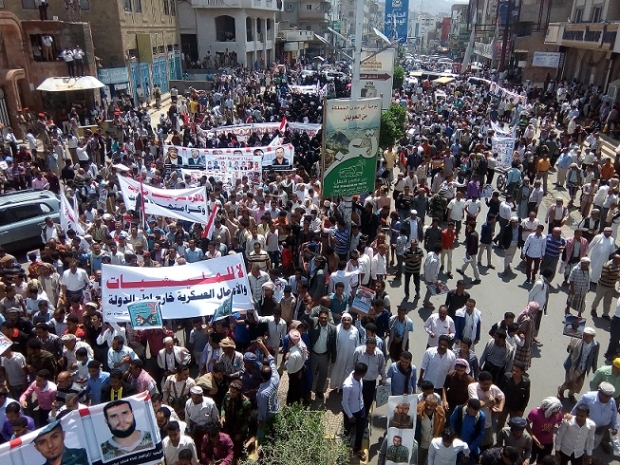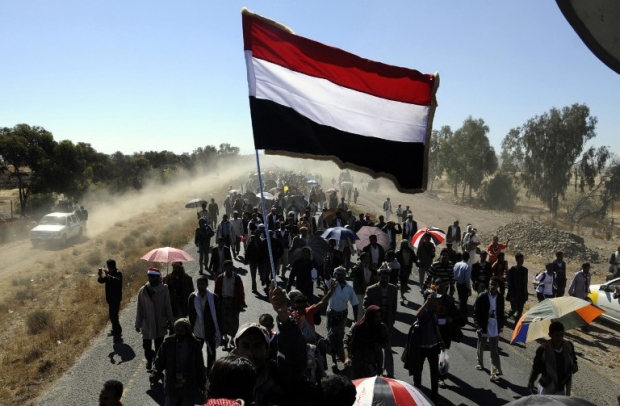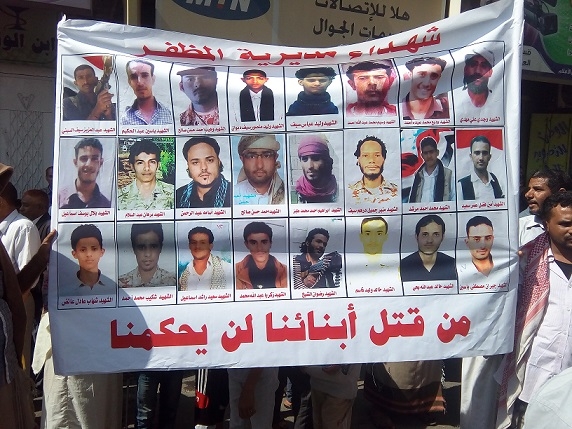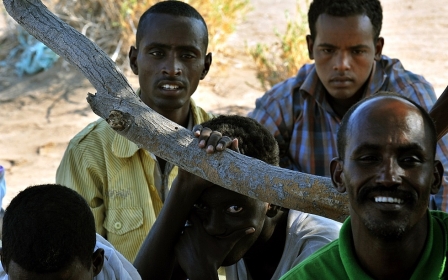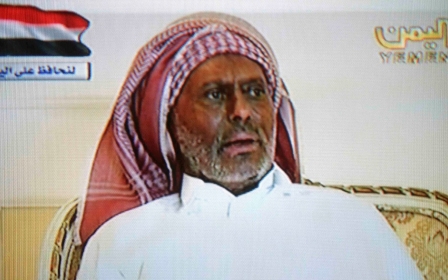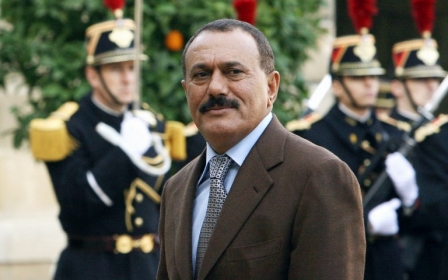A killer or a hero? Nephew of former Yemeni president divides Taiz
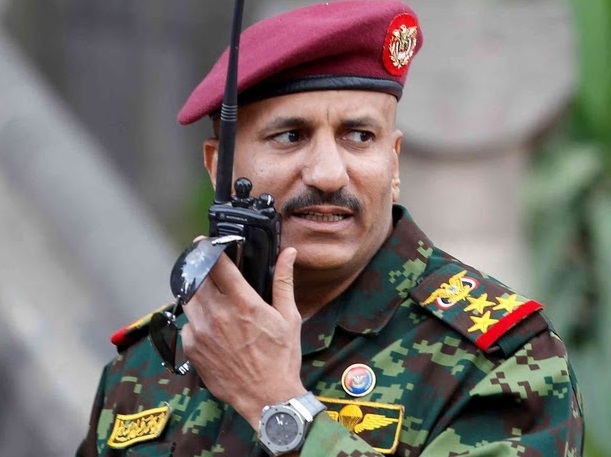
TAIZ, Yemen - He resurfaced in January after reports that he had been killed alongside his uncle, Yemen's longtime former ruler who was infamous for his double-dealing. Now with the help of the Emiratis, he's poised to continue his fight against the Houthis, his one-time ally.
But thousands in Taiz protested this weekend against Tareq Mohammed Abdullah Saleh's newfound role. Many in the southwestern Yemen city see him instead as "a killer" who is responsible for the deaths of Taiz civilians.
Taiz is full of brave military leaders to lead battles and we are not in need of a killer to rule us
- Ali al-Silwi, carpenter in Taiz
Ali al-Silwi, a carpenter who took part in the protests on Saturday, said the younger Saleh had killed residents "twice".
“In 2011, he gives directions to his forces in Taiz to kill civilians in Taiz and again he killed civilians together with the Houthis during this war, so it is difficult to forgive him," Silwi told Middle East Eye.
Until Ali Abdullah Saleh was forced to step down in 2012, Tareq led the Republican Guards, the elite force within the Yemeni army.
When the war in Yemen broke out in 2015, he fought shoulder to shoulder with the Iran-backed group against the forces loyal to Abd Rabbuh Mansour Hadi, his uncle’s successor.
In early December 2017, when Saleh swapped sides and announced his opposition to the Houthis, it was Tareq who led the fight against the Houthis in and around the capital Sanaa.
After the Houthis killed his uncle on 4 December, there were reports that Tareq had been killed. But he escaped, surfacing weeks later in Shabwa province from where he released an 11 January video message calling for an end to the war.
In the south, he has sought shelter with the United Arab Emirates which has control of most of the southern provinces and Mocha district in Taiz province – and see in Saleh an ally to take on the Houthis in the north.
They have opened a huge military camp for Saleh in Mocha and are helping him rebuild the Republican Guards with arms and money. As a result, Tareq now has thousands of soldiers from the south and north under his control.
Taiz' residents and especially members of the Islah party, the Yemeni branch of the Muslim Brotherhood whose supporters form a majority of the city’s population, are particularly dismayed because the Emiratis are their main enemy.
On Saturday, protesters in Taiz raised banners that read "The killer of our children will not rule us” and "Tareq Afash [his nickname] is a main participant in killing and destruction of Taiz until now."
‘Killing us again’
Silwi, the carpenter, closed his workshop on Saturday in order to join the street protest. He said it was important for residents in Taiz to honour friends and family who were killed in the 2011 uprisings and continue to demand trials for all involved, including Saleh.
"The UAE insults Taiz by supporting Tareq Saleh with money and arms and letting Taiz's resistance suffer to find food for fighters. I believe that the UAE does not want to liberate Taiz, but it wants to create more chaos in the city."
During the demonstration, protesters chanted anti-UAE and anti-Saudi-led coalition slogans, accusing the Saudi-led force of betraying Taiz and rejecting any Emirati presence in Taiz, either to support Tareq or to put their forces in charge of security at the city's entrance.
"I want to send my message to the leadership of the UAE asking them, did you hear about killing civilians in 2011 and in this war by Saleh and his regime?” Ghanem told MEE.
"If yes, then you have to help us to subject all members of the last regime to fair trial. If not, then you are participating in killing us again by Tareq Saleh."
Ghanem said that Tareq was unable to protect his uncle from the Houthis in Sanaa where he had thousands of loyalists, so he cannot do anything in Taiz where people consider him a killer.
More broadly, the Emirati presence in Taiz province - which began when pro-government forces, backed by the Saudi-led coalition liberated Mocha from the Houthis in January 2017 - has not helped the city of Taiz at all, said Ghanem.
“I do not accept any good thing from the UAE and hope that they stop supporting the former regime against pro-government forces in Taiz,” he said.
‘Fishing in troubled waters’
After the protests of Taiz on Saturday, Taiz Governor Ameen Mahmood praised the relationship between Taiz and the Saudi-led coalition in a statement.
The province, he said, faces the same fate as that of the coalition – which he praised for supporting Taiz with money and fighters - and no one should be allowed to insult it.
"It is a shame to keep silent against the mercenaries who try to fish in troubled water and it is a crime to allow anyone to split our alliance and insult our alliance with neighbours," the governor said.
The calling for protests by the Islah party against Tareq Saleh shows the bankruptcy of the party
- Fathi Bin Lazraq, editor-in-chief of Aden al-Ghad
He also accused the protest organisers of being “a fifth column” which was trying to create chaos in order to serve the Houthis.
Many believe the Islah party – whose preachers and leaders encouraged supporters to demonstrate during Friday prayers – was the main force behind the protests, a claim a leader of the party has denied to MEE.
But even the party leaders’ encouragement has upset some political analysts, including Fathi Bin Lazraq, editor-in-chief of the Aden-based Aden al-Ghad newspaper
“The calling for protests by the Islah party against Tareq Saleh shows the bankruptcy of the party,” Lazraq wrote on Friday.
Instead of protesting, the party leaders should ask their members to go to the frontline and liberate Taiz from the Houthis – but they won’t do that because they don’t want to lose their supporters, he wrote.
"They want people to sacrifice themselves and Islah will rule them without sacrifice," Lazraq said.
Islahis on the frontline
But a member of the Islah party, who is a leader of the pro-government forces in Taiz, rejected Lazraq’s points, saying that the Islahi members and leaders are fighting on Taiz’s frontlines and beyond.
The issue, he said, isn’t where Islahis are fighting, but the leadership of someone seen as a killer.
“We do not want someone like Tareq to lead us. Islah's members fought Tareq's forces during the last three years and exiled them from several areas in Taiz, so it is a shame to hear someone say we do not fight,” said the member who spoke on condition of anonymity because he is not authorised to talk to the media.
"The Islahi members did not protest as members of the Islah party but as residents of Taiz city and protesters were from all sides and political parties and that was not the protest of Islah,” he said.
Tareq's presence in Taiz, he added, won't liberate Yemen and has only created disputes among the pro-government forces, so it is better for the Saudi-led coalition to contain Tareq's role in the war.
Thousands of supporters
Tareq Saleh’s supporters in Taiz meanwhile keep their support under wraps for fear that they will be seen as traitors.
Anyone who wants to fight with him has to go to Mocha, about two hours southwest from Taiz, where Saleh’s forces are fighting together with the Saudi-led coalition forces.
'Tareq can leave Yemen to live in any country around the world, but he preferred to stay in Yemen to take revenge from the Houthis'
- Elias, Tareq Saleh supporter
Elias, one of Saleh’s supporter, confirmed that thousands of fighters have joined his military unit because they trust that he wants to revenge his uncle’s killers.
"Tareq can leave Yemen to live in any country around the world, but he preferred to stay in Yemen to take revenge on the Houthis and this serves the pro-government forces and it is not dangerous for them,” Elias said.
He said that Tareq’s focus and responsibility is fighting the Houthis on the western coast and, if he withdraws even a metre from liberated areas, Yemenis can protest against him.
"The presence of Tareq in the western coast is not dangerous to the resistance, as he works under the leadership of the Yemeni government and the Saudi-led coalition," he said.
"Any protests against Tareq means rejection of the government decisions, as Tareq's military unit are part of the Yemeni army."
Middle East Eye propose une couverture et une analyse indépendantes et incomparables du Moyen-Orient, de l’Afrique du Nord et d’autres régions du monde. Pour en savoir plus sur la reprise de ce contenu et les frais qui s’appliquent, veuillez remplir ce formulaire [en anglais]. Pour en savoir plus sur MEE, cliquez ici [en anglais].


